Record Reviews
10 Reviews Found. Use search to find more reviews or follow the links in the review text.
  | GRAZYNA AUGUSCIK ~ 2 THE LIGHT
GMA 1724-13 (Barcode: 642613632614) ~ POLAND ~ Jazz
Recorded: 2020 Released: 2023
This is an album by Polish Jazz vocalist / songwriter Grazyna AuguscikFind albums by this artist, recorded during the Covid 19 pandemic in 2020, using remote recording techniques, with fourteen musicians recording in USA, Poland and Sweden. The album was put together by Swedish producer / bassist / keyboardist Stefan PetterssonFind albums by this artist. The Polish musicians, who took part in the recording, contributing (remotely) on different tracks, include violinist Mateusz SmoczynskiFind albums by this artist, accordionist Jaroslaw BesterFind albums by this artist and bassist Krzysztof PabianFind albums by this artist. The album presents nine songs, all composed by Auguscik, with lyrics in English and Polish by different writers, including two with lyrics by Auguscik, three with lyrics by Sara WollanFind albums by this artist and one with lyrics co-written by them.
The music is everything one might expect from Auguscik, a wonderful mixture of Jazz and Folkloristic themes, beautifully lyrical and often deeply melancholic. The rich, almost orchestral arrangements by Pettersson add depth and atmospheric splendor to the music, which expand the compositions to new, often unexpected musical spheres. The solos by the guest musicians are the proverbial cherries on top, adding yet another layer to the final result. The music is certainly on the lighter side of the Jazz spectrum, which should make this album accessible to a wide audience, but does not compromise any aesthetic values and stays sophisticated and creative.
It seems that this album finds Auguscik healed and almost complete again, following the rocky events in her personal life, and ready to pick up her recording career at full blast. She certainly has a lot to share with her faithful followers and her position on the local Jazz scene is still unshaken. Although the Polish Jazz scene has a lot of new young female vocalists, it takes years of experience and practice to reach the level that Auguscik offers, so let’s rejoice and enjoy her offerings.
Overall, this is a beautiful, elegant and moving collection of excellent songs and wonderful performances, which should find many music lovers around the world able to enjoy it in full. Auguscik is an experienced Artist and a seasoned songwriter, which is evident to anybody listening to this music, and she is splendidly supported by great gathering of international instrumentalists, which results in an unbeatable amalgamation of talent. Since these word are written on her Birthday, may I wish you a very Happy Birthday and many more years of creative activity, which is always a blessing!
| | Updated: 17/08/2023Posted: 17/08/2023 | CD 1 Digipak Recommend To A Friend |
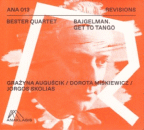 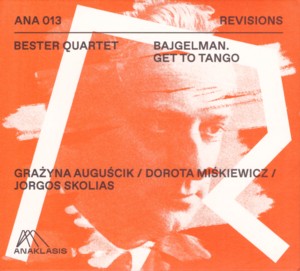 | BESTER QUARTET ~ BAJGELMAN. GET TO TANGO
ANAKLASIS 013 (Barcode: 5907795209739) ~ POLAND ~ Jazz-World Fusion
Recorded: 2020 Released: 2020
This is an album by Polish Jazz ensemble Bester QuartetFind albums by this artist, led by accordionist / composer / bandleader Jaroslaw BesterFind albums by this artist, with violinist Dawid LubowiczFind albums by this artist, bassist Maciej AdamczakFind albums by this artist and drummer Ryszard PalkaFind albums by this artist. The ensemble was expanded for this album to include three top Polish Jazz vocalists: Grazyna AuguscikFind albums by this artist, Dorota MiskiewiczFind albums by this artist and Jorgos SkoliasFind albums by this artist. Trumpeter Michal BylicaFind albums by this artist and cellist Krzysztof LenczowskiFind albums by this artist guest on most of the tracks. The album presents ten tracks, one instrumental and nine songs, all composed by the Jewish / Polish violinist / composer / songwriter / bandleader Dawid BajgelmanFind albums by this artist, with words (originally in Yiddish, except for one in Polish) by himself and other lyricists. This studio recording is a documentation of a special concert originally performed in 2018 as part of the anniversary commemorating the liquidation of the Lodz Ghetto in 1944, with was devised and produced by Miron ZajfertFind albums by this artist. The album was released by the prestigious Polish AnaklasisFind albums on this label label as part of its “Revisions” series.
Jaroslaw Bester was one of the first Polish musicians to accept the challenge of treating seriously the Jewish Music created in Poland during the centuries of Jewish presence on the Polish soil. Sadly, most of the attempts to deal with Jewish Music border between kitsch and chaltura, but Bester managed consistently to avoid falling into this trap over the years. He founded the Cracow Klezmer BandFind albums by this artist in 1997, which later morphed into the Bester Quartet, with a long series of successful recordings to his credit. Following the initial period of focus on the Klezmer tradition, he expanded his vision to include other musical traditions, especially the tango, which became his passion in more recent years. Jewish Music and tango come together hand in hand on this album, since the secular Jewish Music in Poland, during the period between the two great wars, was fascinated with the tango as well.
The life’s story of Dawid Bajgelman is easily divided between his meteoric career before WWII, which found him as a highly successful composer and songwriter, with his songs performed by the most popular Polish singers at the time, but in parallel his massive composing legacy for local Jewish cultural life in Lodz, at the time the second biggest urban Jewish community after Warsaw, and of course his activity in the Lodz Ghetto during the Holocaust period, which came to the end with his tragic death in Auschwitz, cynical and absurd, just a few days after the camp’s liberation. His songs, written in the ghetto, are some of the most expressive manifestations of the horror and misery of that time.
Although Bester’s role on this album seems somewhat less illustrious than on his other recordings, limited to arrangements and leadership of the project, he does an absolutely splendid job herein. The music is brilliantly executed by all the participants, the recording offers a high quality sound and the entire project offers a deeply moving aesthetic experience. The vocalists are amongst the finest Polish Jazz Artists, quite different from each other in every possible sense, and yet they manage to cooperate perfectly when singing duets or trios, in addition to their solo parts. They also manage to handle the Yiddish lyrics reasonably well, but the four texts translated into Polish and the original Polish lyrics are of course as perfect as one might expect from such pros. The vocalese, although used sparingly, is also just right. The instrumental parts are all superbly done, with the new lineup of the Bester Quartet reaching a level of coherence higher than ever before. The trumpet is a nice touch, building an imaginary bridge to the original sound of these songs.
Overall, this is a beautiful album, full of heartbreaking nostalgia and a proper, wonderfully conceived and executed tribute to the great contribution of the Polish / Jewish composer Dawid Bajgelman to the Polish Culture, one of so many so often forgotten Polish Jews, who shaped contemporary Polish identity, whether one likes it or not. My personal thanks to Miron Zajfert, who shares my passion of exposing our proud legacy, and of course to all the participants, who are amongst my favorite Polish musicians. May the Force be with you!
| | Updated: 17/02/2023Posted: 17/02/2023 | CD 1 Digipak Recommend To A Friend |
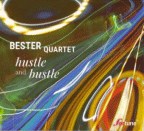 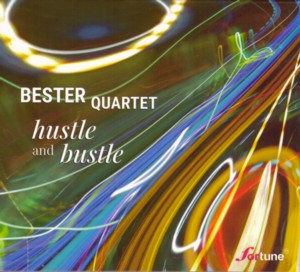 | BESTER QUARTET ~ HUSTLE AND BUSTLE
FOR TUNE 0161 (Barcode: 5906395808762) ~ POLAND ~ Jazz-World Fusion
Recorded: 2022 Released: 2022
The release of this album marks the 25th Anniversary of the Polish Bester QuartetFind albums by this artist, founded in 1997 by accordionist / composer Jaroslaw BesterFind albums by this artist and initially called The Cracow Klezmer BandFind albums by this artist. The current lineup of the quartet includes also violinist Dawid LubowiczFind albums by this artist, bassist Maciej AdamczakFind albums by this artist and drummer Ryszard PalkaFind albums by this artist. The album presents eight original compositions, all by the leader.
On this album Bester takes the listeners on a musical World Tour, which spans between Western and Eastern Europe, the Middle East and eventually reaches the shores of NY. Rather that concentrating on one musical milieu, like Jewish Music or the Tango, which were his earlier fascinations, this time Bester summarizes his experiences over a quarter of a Century, and explores diverse influences, which results in an album offing a much more varied aural experience. The new compositions are blessed with wonderful musicality and melodic depth, and the expanded horizons suit the total result in full.
Another aspect of this album is the increased soloing duty taken over by Lubowicz, who obviously became an “equal partner”, richly deserved by his virtuosic ability and musical sensibility. As a result, the music on the last three albums since the new lineup of the quartet crystalized, offers gradually more improvising depth and tension than the earlier releases. The new rhythm section is also more spirited and supportive, pushing the two soloists even further in their explorations. Together the four members of the quartet are able to create a unison rarely achieved by other ensembles of this kind.
Overall, this is a beautiful, deeply rewarding musical experience, elegantly performed by the quartet members, full of heartfelt dedication and aesthetic involvement. Older and mature and then ever, Bester Quartet is a synthesis of years of experience, education, talent and most of all passion. This is music that heals broken hearts and charges weakened souls, for which we can only be grateful. Thank you Gentlemen and hats off!
| | Updated: 09/01/2023Posted: 09/01/2023 | CD 1 Digipak Recommend To A Friend |
  | BESTER QUARTET ~ KRAKOFF
FOR TUNE 0011 ~ POLAND ~ Jazz-World Fusion
Recorded: 2013 Released: 2013
Rising like a Phoenix from the ashes of the Holocaust, Jewish Culture in Poland, which flourished for almost a millennium before being abruptly and mercilessly eradicated from the face of the earth, enjoys today a tremendous renewed Renaissance. Jewish Culture Festival in Krakow, Warsaw´s Singer Festival and the New Jewish Music Festival are only the main events celebrating the Jewish Culture, which should have disappeared into thin air like the smoke from the chimneys of the crematoriums. However, a cautious examination of this phenomenon reveals several fundamental differences between the pre-Holocaust Polish Jewish Culture and its renewed manifestation:
Firstly Jewish Culture was created by Jews for Jews, rarely, if at all, escaping the closed Jewish environment almost completely separated from their Polish neighbors. Jewish music was performed during Jewish celebrations and Holidays, in Jewish shtetls, where gentiles (goyim) were seldom present. Even in the major towns, like Warsaw itself, Jews had their own entertainment centers, again rarely frequented by gentiles. Since there is no sizeable Jewish population in Poland, today´s Jewish Culture is of course presented to the non-Jewish Poles, most of which were born after WWII, most of them with little or no knowledge whatsoever about Jews and their Culture. And yet for some inexplicable reason this Culture fascinates these audiences, a sort of nostalgia to something they know existed once but is no more.
Secondly, and perhaps more importantly from the Artistic standpoint, the reborn Jewish Culture in Poland is in fact only slightly associated with the original Jewish Culture per se, often referring to the tradition as a source of inspiration rather that an attempt to revive it as it was. Even when the new culture uses the "old" terminology, like the idiom "Klezmer" for example, there is no direct similarity to what is considered or called Klezmer music today to what it was in the past. And yet a continuum was definitely achieved, which is wondrous indeed.
Bester QuartetFind albums by this artist is a classic example of the case at hand. Formed in 1997 by accordionist / composer Jaroslaw BesterFind albums by this artist, the ensemble was initially called The Cracow Klezmer BandFind albums by this artist and under that moniker released six albums on the highly respected TzadikFind albums on this label label owned by John ZornFind albums by this artist. The quartet played ambitious original music, brilliantly performed by its virtuosi members, but quite honestly calling this music Klezmer or even Jewish was definitely farfetched. At some stage Bester probably realized that dichotomy and by 2012 changed the name of the ensemble to Bester Quartet (and also changed the bass player) and since released two more albums on Tzadik, the latest of which, called "The Golden LandFind albums with this title" features music written entirely by Mordechai GebirtigFind albums by this artist and seems to be the closest to Jewish roots.
This, their ninth album, is a live recording at the National Philharmonic Hall in Warsaw, captures the band before "The Golden Land" album was released and features mostly music from their previous album "MetamorphosesFind albums by this artist", a couple of pieces from earlier albums and one sneak preview of a Gebirtig tune. The quartet includes Bester, violinist Jaroslaw TyralaFind albums by this artist, multi-instrumentalist Oleg DyyakFind albums by this artist and the new young bass player Mikolaj PospieszalskiFind albums by this artist. They all perform elegantly, spotlessly and obviously are highly spirited. Of course as a band they are perfectly together and they respect each other´s space, allowing for extended improvised passages.
The music, which is always superbly melodic, is unfortunately somewhat unfocused stylistically. Although the arrangements try to present a "unified" musical coherence, the musical influences run freely between Gypsy folklore, Argentinean tango, Eastern-European melodic lines, Balkan rhythmic patters, in short "around the world in 70 minutes". Jewish? Not really. But of course, since there is no "Klezmer" anywhere on the cover, I have no problem with this. Overall this is music which can be enjoyed by connoisseurs all over the world and people who like to hear diversity and sophistication in the music they enjoy.
The music is beautifully recorded with superb sound quality, especially so in the case of a live recording. The album comes bundled with a DVD of the same concert, which has no additional musical content, but is a nice document of the event. This is the first album by the quartet released on a Polish label and kudos to For Tune for finally putting the record straight, which they do repeatedly time after time.
| | | CD+DVD 2 Recommend To A Friend |
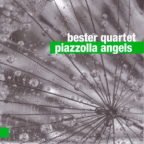 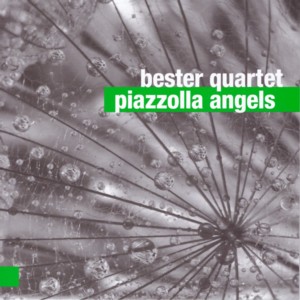 | BESTER QUARTET ~ PIAZZOLLA ANGELS
FOR TUNE 0153 (Barcode: 5906395808687) ~ POLAND ~ Jazz-World Fusion
Recorded: 2021 Released: 2021
This is the twelfth album (second on For TuneFind albums on this label Records) by Polish ensemble Bester QuartetFind albums by this artist, formed in 1997 by accordionist / composer Jaroslaw BesterFind albums by this artist as Cracow Klezmer BandFind albums by this artist. The current lineup also includes violinist Dawid LubowiczFind albums by this artist (see Atom String QuartetFind albums by this artist), bassist Maciej AdamczakFind albums by this artist and drummer Ryszard PalkaFind albums by this artist. The album presents nine tracks, eight of which are compositions by Astor PiazzollaFind albums by this artist and one by Carlos GardelFind albums by this artist, the most famous Tango singer of all time and composer of several famous Tangos. All the music is arranged by Bester.
Considering the fact that all eleven albums recorded by Bester before this one were one way another connected to the Polish “Jewish” / “Klezmer” tradition, the sudden move towards the Argentinean Tango is quite a surprising one. In the liner notes of the album Bester describes his long fascination with the music of Astor Piazzolla and, as far as I understand, it was the influence of the Covid-19 pandemic, which made him realize it is now or never to turn his dream into reality.
Since I am pretty familiar with many interpretations of Piazzolla’s music, especially those by musicians connected with Jazz, I am happy to say that Bester manages to avoid the worse possible traps connected with such projects. First and foremost, the refuses to mimic or copy Piazzolla’s music and try to sound like a genuine Tango musician, which of course is simply impossible. He takes a lot of liberties with the original music, admittedly all in in good taste, transporting it into much more European Jazz flavored environment and even a modest smile. The resulting music is obviously clearly infused with Piazzolla’s spirit but has its own aesthetics. Although Bester’s accordion sounds still similar to the sound of the bandoneon, the violin parts are full of European lyricism deeply rooted in Classical music, and the rhythm section adds the Jazzy spice to the proceedings, which is completely absent in the Tango idiom, which uses guitar and piano all absent here. Even the “Funky” mandolin works fine ;)
Of course one might question these liberties, but as long as Bester is not claiming to play like Piazzolla, but only submit to his magic and insert his own interpretation, for me these liberties work well and are not offending or sacrilegious. Combined with the superb musicianship this album boasts with, I’d say that there is very little of “not to like” here. Piazzolla’s genius is so overwhelming, that it manages to withstand much more abusive treatment than what was applied here.
Overall, this is a pleasant, beautifully played and recorded tribute to one of the greatest geniuses of 20th Century music, which comes here with a Polish “twist”, which I find quite entertaining and tasteful, and which is surely one of Bester’s best achievements so far.
| | Updated: 15/12/2021Posted: 10/12/2021 | CD 1 Recommend To A Friend |
  | BESTER QUARTET ~ THE GOLDEN LAND
TZADIK 8178 (Barcode: 702397817826) ~ POLAND ~ Jazz-World Fusion
Recorded: 2013 Released: 2013
The Polish / Jewish poet / songwriter Mordechai GebirtigFind albums by this artist was born, raised and lived in Krakow, where he also found his tragic death from a Nazi bullet in the Krakow Ghetto in 1942. His vast legacy proves he was the preeminent Yiddish songwriter of his time, but more importantly his prophetic vision of the Jewish fate in Europe is truly astounding in retrospect.
This album presents a collection of ten songs written by Gebirtig and performed by the Bester QuartetFind albums by this artist, a Polish ensemble, which also comes from Krakow. The ensemble was originally formed as the Cracow Klezmer BandFind albums by this artist in 1997 and later on changed its name to Bester Quartet. The songs were arranged by the leader of the Bester Quartet, accordionist / composer Jaroslaw BesterFind albums by this artist. The remaining members of the quartet are violinist Jaroslaw TyralaFind albums by this artist, multi-instrumentalist Oleg DyyakFind albums by this artist and bassist Mikolaj PospieszalskiFind albums by this artist. On this album the lineup also features three guest musicians: trumpeter Tomasz ZietekFind albums by this artist, cellist Magdalena PlutaFind albums by this artist (from SamechFind albums by this artist) and bass clarinetist Marcin MalinowskiFind albums by this artist.
The Cracow Klezmer Band / Bester Quartet released eight (including this one) albums on the prestigious TzadikFind albums on this label label, as part of the "Radical Jewish Culture" series, which marks them as the heroes of the Jewish Cultural Renaissance in Poland, which is now in its second decade. Some people, me included, find this "Renaissance" somewhat perplexing, intriguing and even a bit ridiculous, especially in view of the fact that there are practically no Jews left in Poland and the infamous Polish anti-Semitism is still looming in the background. But a thousand years of Jewish presence in Poland can be still traced and the fact that some artists are interested in preservation of this lost Culture is wonderful regardless of the circumstances.
Bester and his companions are all truly wonderful musicians and his skillful arrangements are delightful and quite sophisticated. I would have enjoyed this music much more if it wasn´t pre-sold under the Jewish tag, as honestly there is very little left of the original Eastern-European Jewish feel herein. Yes there are some sentimental violin or clarinet parts, and other typical shticks but overall this is simply some great Jazz-World Fusion, which sounds Argentinean, Parisian, Balkan or whatever, and honestly since I know these songs in their original versions since my early childhood, I´m not sure Gebirtig himself would have recognized them as his own.
Nevertheless this music deserves to be heard and can be enjoyed by music connoisseurs anywhere in the world. The level of performances and execution is definitely first-class and there is so much beauty and deep melancholy in this music that nobody should be left cold. Personally some other releases in the Radical Jewish Culture series on Tzadik made a much stronger impact on me than this release, but I can still appreciate the dedication and talent that went into making this recording. A bi gezunt!
| | | CD 1 Recommend To A Friend |
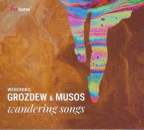 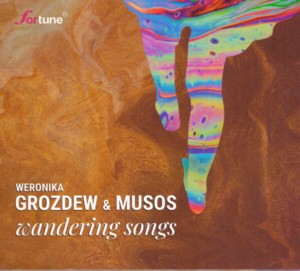 | WERONIKA GROZDEW & MUSOS ~ WANDERING SONGS
FOR TUNE 0167 (Barcode: 5906395808809) ~ POLAND ~ World Music & Folklore
Recorded: 2021 - 2023 Released: 2024
This is an album by Polish vocalist / ethnomusicologist Weronika GrozdewFind albums by this artist, a prominent activist on the local scene with impressive academic career, but also a great performer and of course Folklore Music lover. She is accompanied by an instrumental ensemble fondly named MusosFind albums by this artist, which includes dulcimer player Marta MaslankaFind albums by this artist, violinists Dorota Blaszczynska-MogilskaFind albums by this artist and Kacper MaliszFind albums by this artist, violist Alexandra Demowska-MadejskaFind albums by this artist, cellist Bartlomiej PalygaFind albums by this artist, bassist Wojciech PulcynFind albums by this artist and percussionist Wojciech LubertowiczFind albums by this artist. A few additional guests appear on selected tracks, including the celebrated vocalist Grazyna AuguscikFind albums by this artist. The album presents ten tracks, with songs originating from various sources, including Greece, Bulgaria and of course Poland, several of which were written by Polish folk violinist Bartosz NiedzwieckiFind albums by this artist. Four of the songs were arranged by accordionist / composer Jaroslaw BesterFind albums by this artist.
The music presents a stunning collection of Folk songs, which although originating from diverse origins and being a random collection, form a perfectly coherent continuity, brilliantly sung and played by everybody involved, including some virtuosic voice modulations and other tricks of the trade. The album perfectly demonstrates the fact that beneath the seemingly naïve and simplistic Folklore music there is a great aesthetic depth and often musical complexity, which puts to shame much more “prestigious” music genres.
The album shows an absolute love and admiration of all the participants towards the music and the absolute seriousness it is treated by them. I was particularly impressed by the superb parts played by Pulcyn, who is usually associated with the Polish Jazz scene. His steady pulsations hold the music together perfectly. But the string quartet also does an amazing job by setting the melodic / harmonic background, which often becomes quite tricky. Auguscik adds a lengthy improvised vocalese on one tune, which is a knockout.
I am happy to see the For TuneFind albums on this label Records label becoming a steady supporter of Folk Music recordings, which are consistently of the highest quality and sadly badly missing on the Polish scene. Their “green” series is certainly a mark of quality in that respect, and deserve both attention and support.
Overall, this is a beautiful vocal Folk Music album, which offers an ambitious stream of wonderful songs, excellently supported and accompanied by the instrumental ensemble, all of which offers a brilliant listening experience and for Folk Music lovers a truly heavenly moment of joy.
| | Updated: 28/03/2024Posted: 28/03/2024 | CD 1 Digipak Recommend To A Friend |
  | SKOLIAS & BESTER ~ REBETIKO POLONIKO
FOR TUNE 0142 (Barcode: 5906395808564) ~ POLAND ~ World Music & Folklore
Recorded: 2018 Released: 2019
This is a wonderful album by two Polish musicians: charismatic vocalist Jorgos SkoliasFind albums by this artist (obviously of Greek origin) and accordion virtuoso Jaroslaw BesterFind albums by this artist. As the album´s title suggests it offers somewhat polonized versions of traditional Greek Rebetiko songs. The album presents twelve tracks, eleven of which are of traditional origin and one is an original instrumental composition by Bester.
I have no idea how many listeners in Poland have been exposed to Rebetiko, or even any other kind non-popular Greek music, but for me this album is a true feast for the ears. Outside of Greece, Israel is probably the most likely place on earth to hear Rebetiko on a daily basis, on the radio or on stage in the small tavernas in Jaffa, where the majority of Israelis of Greek origin made their homes. Rebetiko and its Cultural, historical, social and musical significance is so vast and diverse that it requires years of study to be comprehended properly. But since the music of our Mediterranean neighbors is so close to our hearts, even without being a music scholar this music can be, and in fact is dearly loved here.
Of course the accordion is not the immediate instrument associated with Rebetiko; the bouzouki is the absolute monarch of the genre and great Masters of the instrument are much loved and cherished in Greece, often way more than Pop stars. Bester steps boldly into the challenging circumstances involved in this recording and his adaptation of the Rebetiko atmosphere is truly superb. Rather than trying to imitate the original sound, he takes the music to his familiar neighborhood of Polish Folklore and Hassidic Music, creating the "Rebetiko Poloniko" atmosphere which the album´s title hints to. Bester´s accordion playing exposes the unlimited possibilities of the instrument on the one hand and his incredible sensitivity and musicality on the other hand.
Skolias handles the traditional Rebetiko in his own idiosyncratic way, again not imitating the famous Masters of the idiom, but creating a new approach which mixes the Greek origins with Blues and other European vocal traditions. The resulting vocal delivery masterfully emphasizes the universality of music. His version of Rebetiko might raise some brows in a Piraeus taverna, but will surely be embraced for its evident honesty and intrinsic beauty.
Overall this is a beautiful album, from start to end, which should touch any true music lover, even if this is his first encounter with Rebetiko magic. Congratulation to both musicians for the courage and vision needed to tackle such an ambitious project and deep thanks for the album´s emotional value.
| | Updated: 19/07/2019Posted: 18/07/2019 | CD 1 Recommend To A Friend |
  | IRENEUSZ SOCHA ~ POLIN
MATHKA ~ POLAND ~ Electronic & Ambient
Recorded: 2004 - 2008 Released: 2012
This album by veteran Polish Avant-Garde activist (drummer, vocalist, sound artists, improviser and composer) Ireneusz SochaFind albums by this artist is dedicated to the convoluted history of Jews in Poland. Since the Middle-Ages, when Jews arrived in Poland and settled there in huge numbers, they developed over the years a magnificent and thriving Jewish culture, but no less importantly they also contributed radically to the development of Polish culture. Hundreds of years of Jewish presence in Poland came abruptly to a horrific end during the Holocaust, leaving Poland almost completely Jew-Free, and burying the Jewish / Polish Culture buried under the ashes of the crematoria. The few remaining Polish Jews left Poland just a couple of decades later, during the repulsive March 1968 political upset.
Since Poland managed to free itself from the Socialist regime by the end of the 1980s, many Polish intellectuals and the tiny Jewish community still present in Poland managed to create an impressive Renaissance of interest in Jewish Culture, slowly unearthing historical evidence of Jewish Cultural life in the past and organizing Jewish Cultural life in the present, with festivals, lectures, museums and many other activities. The overall scope of these activities is quite impressive and often surprising.
The music created by Socha for this album is a collage of electronic sounds and samples, subdivided into nine chapters but playing continuously. Socha also adds some percussion sounds and bayan (type of accordion) player Jaroslaw BesterFind albums by this artist contributes some folklore-based sound layers. The poet Jaroslaw LipszycFind albums by this artist recites one of his poems, which becomes part of the sound collage. The numerous samples are taken from sound archives and include pre-Holocaust recordings portraying Jewish Culture and other significant sound evidence relevant to the whole project. The entire piece is only slightly over 20 minutes long, but it is very intensive and requires attentive listening.
Avant-Garde music can often be dangerously close to senseless cacophony and it´s really great to see that Socha´s project manages to avoid this trap. It is challenging and demanding, but makes perfect sense both conceptually and sonically. This album is a worthy follow up to Socha´s earlier "Sztetlach" project, which shares the same subject matter.
One can only hope that this worthy effort will be eventually discovered by as many listeners as possible!
| | Updated: 12/04/2019Posted: | CD-R 1 Digisleeve Recommend To A Friend |
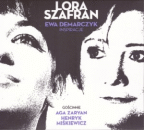 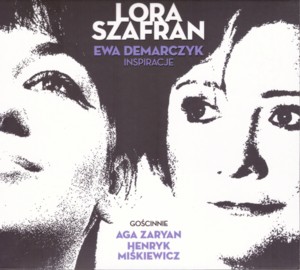 | LORA SZAFRAN ~ EWA DEMARCZYK: INSPIRACJE
POLSKIE RADIO 2444 (Barcode: 5905610871109) ~ POLAND ~ Jazz & Poetry
Recorded: 2023 Released: 2023
This is an album by veteran Polish Jazz vocalist Lora SzafranFind albums by this artist, supported by a formidable team of instrumentalists, fronted by pianist / arranger Milosz WoskoFind albums by this artist, drummer Sebastian FrankiewiczFind albums by this artist, bassist Adam KowalewskiFind albums by this artist and others. She also invited three guest: vocalist Aga ZaryanFind albums by this artist, saxophonist Henryk MiskiewiczFind albums by this artist and accordionist Jaroslaw BesterFind albums by this artist, who appear on selected tracks. The album presents ten tracks, all being songs associated with the repertoire of the Polish Diva Ewa DemarczykFind albums by this artist, six of which were composed by the legendary Zygmunt KoniecznyFind albums by this artist, two by Andrzej ZaryckiFind albums by this artist and the remaining two by others. The lyrics are mostly by renown Polish Poets, like Julian TuwimFind albums by this artist and others.
Any attempt to touch an icon / legend / idol of the class of Demarczyk is a highly risky and virtually impossible task. Although the new arrangements of these songs, which are taken more into the Jazz environment, rather than the original chanson / theatrical idiom created matchlessly by Demarczyk, the comparisons are inevitable, and sadly come out rather oddly in the ears of anybody familiar with the original.
Of course one has to give credit to the new arrangements and the excellent work by the instrumentalists involved, as well as Szafran’s vocal abilities and the throaty coloring of her voice, all of which are truly admirable. Still, the mind does not allow to separate oneself from the deeply seeded impressions and memories of the original. Some things are obviously better left alone…
Overall, this is an impressive production / arrangement / execution in every respect, but I am simply too old to let my personal memories be forgotten, which is apparently needed in order to enjoy this album, beyond appreciating the effort. Of course these songs are still absolute treasures of Polish Culture.
| | Updated: 29/12/2023Posted: 29/12/2023 | CD 1 Digipak Recommend To A Friend |
|







